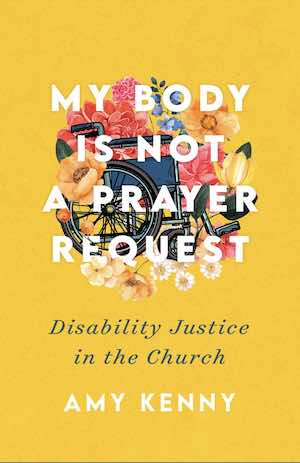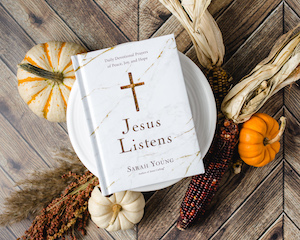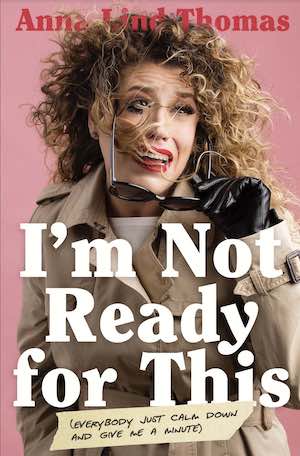Every Single Body is Wonderfully Made By God: Dr. Amy Kenny and Anna Lind Thomas
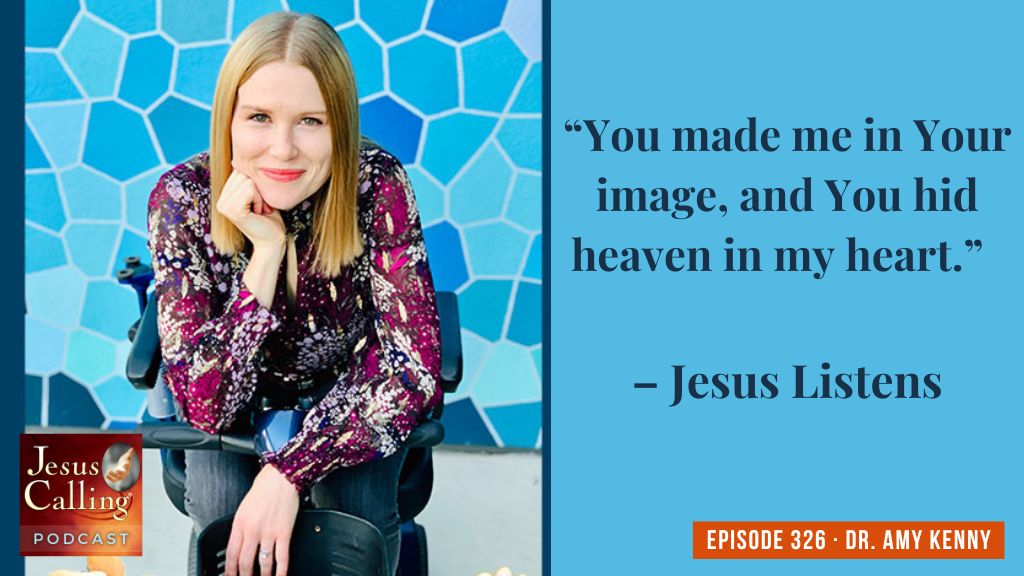
Dr. Amy Kenny: Little in nature is straight. Creation is jagged. The bumpy trunks of redwoods, the jagged edges of maple trees. Nature is delightfully crooked. And I began to come to terms with really believing the truth that my disabled body is fearfully and wonderfully made, and that even her crookedness displays divinity.
Every Single Body is Wonderfully Made By God: Dr. Amy Kenny and Anna Lind Thomas – Episode #326
Narrator: Welcome to the Jesus Calling Podcast. Where does the human body fit into our theology? In Scripture, humans are said to be “created in the image of God,” [Genesis 1:27] but overall the creation of our bodies can be a great mystery, and we cannot say it has been created in the image of God without trying to understand what that phrase means. We don’t get to choose its color, its height, or even the basic functionality of its parts. It remains largely an unpredictable, dynamic space that we must learn to inhabit, love, and enjoy as the most basic gift we’ve been given.
Both of our guests this week have learned to love the bodies that they were given. Dr. Amy Kenny is a disabled scholar and lecturer in Shakespearean studies at the University of California Riverside. She celebrates the beautiful vulnerability of her disabled body within the theology of the image of God and she advocates for disabled and unhoused people. Anna Lind Thomas is a comedian who overcame perceptions of being the “ugly duckling” when compared to her sister by taking time to hone her comedic craft, learn radical self-compassion, and celebrate the unpredictability of our human bodies.
Let’s begin with Dr. Amy Kenny.
Dr. Kenny: My name is Amy Kenny, and I’m a disabled woman who is unapologetically disabled because my disabled body reflects the risen Christ. I am an ambulatory wheelchair user and cane user. My accent tells a little bit of my story, I’m from Australia. I now live in the United States. I’m a scholar, an educator, a learner, a listener. I’m invested in supporting folks who are unhoused in my community.
God’s Divine Nature is Seen in Creation
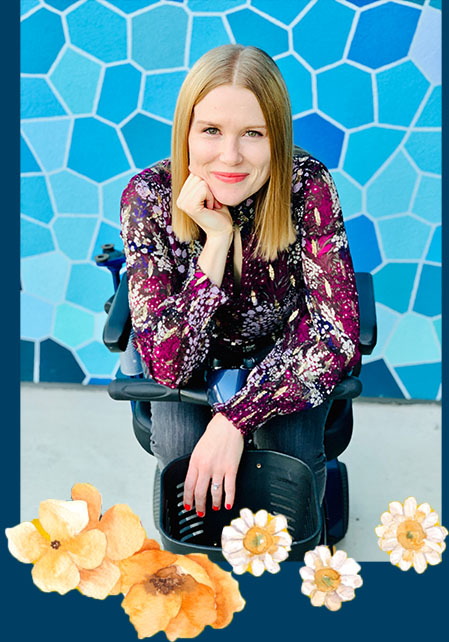
As a disabled kid, I was often told, sometimes explicitly and sometimes implicitly, that if I believed enough or had enough faith, I would not be disabled. Folks would try to promise away or insist that it wasn’t God’s will for me to be disabled. Never mind that Jacob and Jesus and Paul are disabled in Scripture. There was no real room for disability in this theology, and when curing prayers didn’t yield the results that people were looking for, when I was still disabled, folks would often blame God or blame me. “What sin is preventing you from getting up and walking?” I would be asked. Or, “If you just believed you would be cured,” I would be told. And beyond those explicit examples, there were a lot of implicit examples. I only ever remember disability being conflated with sin or defect or tragedy when it was preached upon. I never remember a story celebrating the redeeming wounds of the resurrected Christ, or talking about how disability is a way to encounter the living God. And I think most people are really well intentioned and they’re just trying to be faithful. But they don’t realize the negative impact that that has to receive from people over and over again, that your body is somehow extra sinful or extra tragic. And that just doesn’t make sense with the truth, that we know that all of us are made in the image of God.
We’re told in Romans 1:20 that the invisible qualities of God’s divine nature can be clearly seen in creation. And so I started to look. I remember being told so repeatedly as a kid that my body is crooked, that it is defective and disabled. And so I started to look out to nature and try to see where I could witness those invisible qualities of divine nature. And when I did, I noticed that nature is crooked, even though doctors were using that as a way to demoralize my body. And then I started to notice the same thing in animals that I started to understand in connection to my own disabled body. The kangaroo can’t walk backwards and it can’t really walk at all. Kangaroos kind of hop and bounce. And that’s similar to my cane assisted gait. Lions sleep most of the day, and no one shames the lion for sleeping twenty hours a day. They’re fast and fierce and we want to be like them. And no one belittles the penguin because it cannot fly. I can see the waddle of the penguin in a really similar way to how I waddle. And we know that penguins do that to conserve their energy.
And so I started to realize that if the invisible qualities of God’s divine nature can be clearly seen in that crookedness of trees, in the bouncing kangaroo, in the languishing lion, and the waddling penguin, then why can’t I see it in myself, in my own disabled body?
“I started to realize that if the invisible qualities of God’s divine nature can be clearly seen in that crookedness of trees, in the bouncing kangaroo, in the languishing lion, and the waddling penguin, then why can’t I see it in myself, in my own disabled body?” – Dr. Amy Kenny
Curing Versus Healing
Too often, churches are really invested in curing, which is a physical process. It’s individual, usually pretty rapid, and its sole purpose is to eliminate disease or disability. But that’s not the same thing as healing. Healing is much richer because it is a process of restoring interdependence, spiritual dimensions, relationships. It restores someone to the community. It’s so much richer and takes so much more time than a quick fix or popping a pill.
A passage of Scripture that’s really important for me and my journey, understanding the difference between these two things, is when the disciples encounter a blind man in John 9 and they ask Jesus, “Who sent this man, his parents?” And Jesus says, “Nope, he’s blind so God’s work can be revealed.” That is actually a much richer picture closer to the one that Jesus gives us in Luke 14 of that accessible banquet where poor and disabled folks are invited without condemnation or cure, and it’s about creating a community together. And what if we could be that community for one another?
I think there is so much ignorance around disability, but there’s also so much fear. There’s fear that people will say or do the wrong thing. Fear that people will become like me and end up disabled. There’s fear that you’re not in control of your own body or your own life, and that there are no guarantees in life. And that scares a lot of people. But we know that love casts out fear. And so what if we loved our disabled neighbors enough that we were willing to cast out all of those fears about getting it wrong about disability? And instead we could actually co-create a community that loved one another enough to change?
Even Our Pain is a Prayer
As a kid, I think I worried about not praying enough because we’re supposed to pray without ceasing. And that seemed kind of daunting. But I think I realized as I grew in faith that I breathe without ceasing, hopefully. And I started to imagine my breath as a type of prayer, that I get the gift of waking up every morning and I inhale gratitude for my life and exhale the worries that take me away from that. I consider the lilies of the field and the birds of the air. And I practice really acknowledging the beautiful vulnerability of my life. I listen to my body and acknowledge that she is a temple and I try to behold those invisible qualities of divine nature throughout creation as a practice every day to make sure I am rooted.
“I practice really acknowledging the beautiful vulnerability of my life. I listen to my body and acknowledge that she is a temple and I try to behold those invisible qualities of divine nature throughout creation as a practice every day to make sure I am rooted.” – Dr. Amy Kenny
I ask for my pride or chaos or junk to not get in the way of helping me love my neighbors well. And I have learned that even my pain is a prayer. And I don’t mean by that when I’m in pain, I pray more. I mean that even my pain is a way of knowing that the suffering, Christ knows what it means for word to take on flesh. And it’s a way of acknowledging that my disabled body declares the truth that we are from ash and we will one day return to ash. And that day might be sooner than we plan. But my disabled body also declares what the Creator can do with a little bit of ash. And so I give thanks for that. And I ask for the creativity to make kingdom come here on Earth.
“My disabled body declares the truth that we are from ash and we will one day return to ash. And that day might be sooner than we plan. But my disabled body also declares what the Creator can do with a little bit of ash. And so I give thanks for that.” – Dr. Amy Kenny
I think that the primary purpose of prayer isn’t to treat God like a cosmic vending machine and demand that God do what we think is best, but rather to commune with the living God. My prayers are lament and crying out for justice. My prayers are about breathing in the core spiritual truth that I am made in the image of God. They are about sharing the pain and pleasure of my life, and waiting in the silence attentively and with hope, even when it’s heavy or hard.
And it is really true to that messy work of healing that comes by way of prayer that is relational, intimate, emotional. And beyond that, I think that it’s important to note that not all disabled people want to be cured. Not all disabled people are wanting their disabilities to be erased. I think all of us yearn for society to be healed and the ways that it erases and eradicates us. And sometimes when folks first hear that, they’re surprised because they have been led to believe that disability is bad or a burden. And so they hadn’t realized that not all of us are yearning to be non-disabled. And I think part of that is that we’re missing out on this rich prayer life. And part of it is that we are missing out on thinking about how disability is portrayed throughout Scripture.
So I would invite us to move beyond thinking about disability as something that needs to be cured or fixed and start to witness the ways that God is already at work in the lives of disabled people. And that disability is often understood as a blessing or a prophetic witness in Scripture and in our lives today.
From Jesus Listens, January 21st:
Gentle Jesus,
As I look at this day that’s stretching out before me, I see a twisted, complicated path—with branches going off in all directions. I start wondering how I can possibly find my way through that maze. But then I remember: You are always with me, holding me by my right hand. I recall Your promise to guide me with Your counsel, and I begin to relax. When I look again at my pathway, I notice that a peaceful fog has settled over it—obscuring my view. I can see only a few steps in front of me, so I turn my attention more fully to You and start to enjoy Your Presence.
You’ve been showing me that the “fog” is a protection You provide for me—calling me back into the present moment. Though You inhabit all of space and time, You communicate with me here and now. Please train me to keep my focus on You and on the path just ahead of me. Then the “fog” will no longer be necessary as I walk through each day with You.
In Your comforting Name,
Amen
Narrator: To learn more about Amy Kenny’s work, look for her book, My Body Is Not a Prayer Request: Disability Justice in the Church, wherever books are sold.
Stay tuned to Anna Lind Thomas’s story after a brief message.
When We’re Looking for Hope, Jesus Listens
Sometimes life can be really stressful, whether it’s personal difficulties or world issues that make us feel overwhelmed. When we’re looking for hope and connection amid struggle, God is still there, ready for us to turn to him in prayer.
That’s why Sarah Young wrote Jesus Listens: to deliver a message of peace, love and hope to her readers every day. Jesus Listens is a 365-day prayer devotional with short, heartfelt prayers based on scripture, written to deepen your relationship with God.
Learn more about Jesus Listens and download a free sample.
Anna Lind Thomas had always seen herself as the ugly duckling amidst a family of beautiful swans. Always being compared to her sister, as a self-admitted “chubby” child, Anna began to feel as if she was a disappointment to others. But she found early on that humor was a gift that could propel her out of her darker thoughts and bring joy to others. As she began to lean into what it meant to be a person who could see the funny side of life and actually turn it into a career, she would also learn to love exactly who God created her to be—not just the mind that gave her the ability to make others laugh, but her physical body as well.
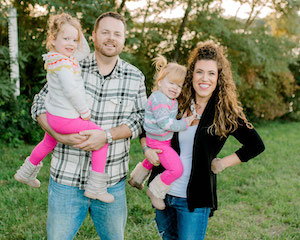
Anna Lind Thomas: My name is Anna Lind Thomas, and I’m a humor writer. I am married to my husband, Rob, and we have two little girls, Lucy and Poppy.
I grew up so awkward. And my whole entire family was beautiful. I had this beautiful Sicilian Sophia Loren mother, this big strapping Sicilian dad. My brother was muscled up and athletic, a top athlete in high school. And my sister, she was the kind of beauty that like people stop her in public. I would have people, boys, ask to come over to my house so that they could be around her. It was that kind of a beautiful, right? And because my sister was older and she loved me so much and we were so close, I was never jealous of her.
But it did make me feel like I was a disappointment, like I was the ugly duckling. And I will say that because I was a chubby kid and you get less attention and you have far less boys calling you and wanting to spend time with you. I had more time to work on my craft, to work on my craft of writing, to work on my humor. I knew that humor was a skill that would help me get attention, that my looks wouldn’t.
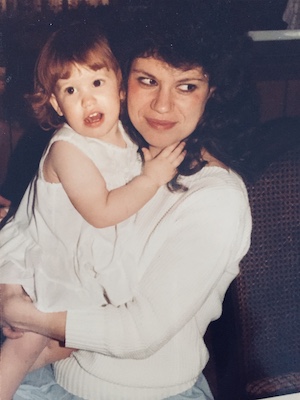
I grew up in a very funny family and with a very witty and outrageous and pointed sense of humor, particularly from my dad. And I’m the baby in my family by a lot. My sister’s ten years older. My brother is five years older. And so I spent a lot of time observing my parents and older siblings a lot. And our dinners together were literal comedy roasts. And what I noticed was that the person getting roasted always laughed the loudest and almost felt like it was an honor to be chosen. I remember being little and so my jokes weren’t quite as nuanced, but I remember starting to get my first laughs with my family and nothing was better. And all I knew was that I wanted to get more of those. So that’s how it all started.
And so that I realized that not taking yourself so seriously is a gift, and having a healthy sense of humor about yourself, it really is a skill and it’s kind of a nice way to live. I mean, you’re just having fun all the time. I feel like getting perpetually offended must be a miserable way to live.
“I realized that not taking yourself so seriously is a gift, and having a healthy sense of humor about yourself, it really is a skill and it’s kind of a nice way to live.” – Anna Lind Thomas
And so I wouldn’t give away my childhood in a million years. I just tell that little chubby girl who’s feeling bad about herself, “Girlfriend, it’s going to work out. It’s going to be okay. It is a good thing right here. Write your poems. Write your stories.” Because it gave me such a great time to really work on who I was going to inevitably become. It’s also made me a more compassionate person. I wouldn’t give it up in a million years, how things turned out for me.
Humor and laughter is such an incredible skill and it’s a wonderful gift. And so for it to come from such a dark place or to be an overcompensation for insecurity or pain of some sort, it just doesn’t feel like it gives that gift justice.
Respecting the Bodies God Gave Us
All of my life from being a chunky kid, I’ve never liked my body. My body has never been good enough. My teeth have been too big, my mouth is too big. I’m always trashing my body and the way my body looks my whole life. And when I got to forty, something really weird happened where—I used to run just to see if I could do it. Basically, I ran a half marathon. I do not have a runner’s body. I’d say I have more of a quilter’s body, someone who just likes to relax with a good beverage and do that busy work while you laugh and gossip with a girlfriend. That’s the kind of body I have.
But I had this—for probably a month—incredibly strong urge to run and to exercise. And it was really bizarre, I couldn’t figure out where it was coming from or why, what was this? Why would I feel so prompted to run? And I kind of had this moment where I was like praying and talking to God and just being quiet and really listening to Him. And I realized that my body wanted my respect. And I’ve never respected it my whole life. My body wanted my respect. Think about what our bodies do for us every single day, just to wake up in the morning, what our bodies are fighting—God gave us these bodies that fight for us every millisecond to stay alive, to stay alert, to be healthy, to fight off viruses. And the way we disrespect it with our habits and the way we eat and the way we don’t exercise it and the way we talk to it and the way we treat it. And it’s a miracle. Our bodies are actual miracles.
This is God’s gift to us. It is our temple. And I can only imagine that it is hurtful to hear the things I say about this gift He’s given me and the temple that He’s given me and the disrespect that is. And so it really was a changing moment for me. Of course, I have a sense of humor about my body or maybe my chin hair or whatever. I think I need laughter therapy to get through it. But I also have a real sense of love now and appreciation for my body and just a really strong desire to love it and to treat it well.
Why God Gave Us Laughter
There’s real science behind what laughter does to our body. And there is this wave of doctors who are prescribing funny movies for patients who have just been diagnosed with a very serious illness like cancer, for instance. It’s kind of like after you’re done, go home and watch hilarious movies, I mean, just back to back to back, because there are true healing effects that it has on our body.
There is something about that deep belly laugh that makes us be like ‘ okay, I can handle this. Let’s go for it.’ There’s really true power in that, and it’s such an important thing.
“There is something about that deep belly laugh that makes us be like, Okay, I can handle this. You know, I can do this, I can handle this, let’s go for it. There’s really true power in that, and it’s such an important thing.” – Anna Lind Thomas
You know, trauma, loss, these things happen. Grief is a season that needs to be walked through fully. There’s no shortcuts to that. But most of us, especially living in the USA, have big breaks in between. And during those breaks, we better be laughing. We better be having joy, and we better be filling it with peace. Because if our day is ruined over a comment or getting cut off in traffic or some type of major inconvenience or something stupid over money, then we’re giving our joy and our peace away so easily. And they’re precious.
Laughter and peace in turbulent times really is a gift. We have ups and we have downs. And the most beautiful thing we can do in those times, it’s just a matter of our faith and continuing to trust God, to trust that if it doesn’t happen for a reason, He at least is going to turn it out for our good, and to keep going.
From Jesus Listens, December 7th:
Beloved Jesus,
When my mind and heart are quiet, I can hear You inviting me to draw near. Drawing near to You requires no great effort on my part; it’s more like surrendering to You and ceasing to resist the magnetic pull of Your Love.
Help me, through Your Spirit, to open myself more fully to Your loving Presence so that I may be filled to the measure of all Your fullness. I yearn to have power to grasp how wide and long and high and deep is Your Love for me—and to know this Love that surprasses knowledge. This vast ocean of Love cannot be measured or explained, but it can be experienced.
In Your amazing Name,
Amen
Narrator: You can read Anna’s hilarious stories in her book, I’m Not Ready for This, available now wherever books are sold.
If you’d like to hear more stories about being made in God’s image, check out our interview with Miles McPherson.
Next Week: Tara Cole
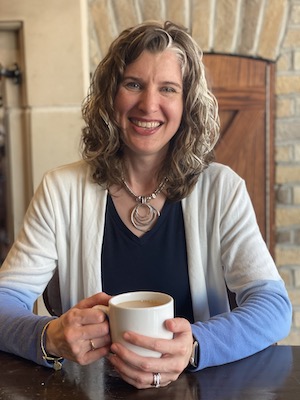
Narrator: Next time on the Jesus Calling Podcast, we’ll hear from educator Tara Cole, who advises parents how to manage their kids’ free time with healthy and productive activities, and teaching them the basics of having a relationship with God through prayer.
Tara: Oftentimes when we’re praying, we are disheartened. We wonder if God’s really listening to our prayers. And so I want to kind of encourage you to think of prayer in a few different ways. One, there are those prayers that God answers before we even ask them. He says in Matthew that if you seek first the Kingdom of heaven, He’ll provide all these things for you.
